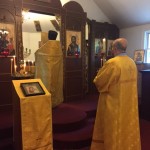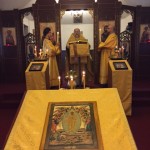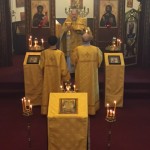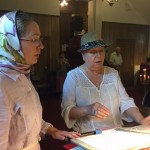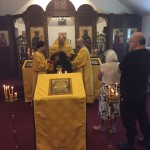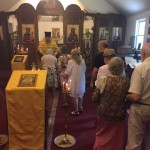On June 25, on the 3rd Sunday after Pentecost, Rector of St. George Church, Archpriest Igor Tarasov served the Divine Liturgy in our parish temple. Following the readings from the Sacred Scripture he preached the following homily in English:
“Today’s Gospel lesson is taken from the famous and important Sermon on the Mountain preached by our Lord Jesus Christ in the very beginning of His ministry. And today’s reading gives us three points to think about.”
“First, the Lord says, “The lamp of the body is the eye. If therefore your eye is good, your whole body will be full of light. But if your eye is bad, your whole body will be full of darkness” (Mt. 6, 22-23). Here Jesus is not talking about our physical eyes but about our mind which is the commander of our personal life. It is our spiritual sight, the way we see things around us. If we see things to be good or proper, then all our body and soul, all our life will be good and proper. But if we see only negative things and dislike everything around us, then we live in darkness. In the same way, if our mind is preoccupied with sinful matters, we live in sin, in a great darkness. Therefore, we need to watch our mind and keep it pure and sinless.”
“The second important point our Lord makes is that we cannot serve two masters (Mt. 6, 24). Even in practical and literal sense it is impossible to be a servant of two lords, especially if those lords oppose each other. Jesus says that we cannot serve God and mammon. Mammon in Hebrew meant wealth and possessions. For many people mammon was an idol to whom they dedicated their lives. And nowadays it is the same. Many people serve the idol of wealth. But if they do, they cannot claim to be also the servants of God. At the same time a true servant of God can still be a wealthy man. However, his wealth is not his goal of life, is not his idol, but just an instrument he could acquire. He lives not for his wealth but uses his wealth to live and please God. But if a rich man lives in order to keep and gain more possessions, he is driven away from God and serves mammon.”
“These reflections lead us to the third point the Lord makes for us in today’s Gospel lesson. He teaches us not to worry about our life, not to be concerned about what we will eat, drink or wear. His speech about this is very beautiful and poetic. He says, “Look at the birds of the air, for they neither sow nor reap nor gather into barns; yet your heavenly Father feeds them. Are you not of more value than they?” (Mt. 6, 26). “Consider the lilies of the field, how they grow: they neither toil nor spin; and yet I say to you that even Solomon in all his glory was not arrayed like one of these. Now if God so clothes the grass of the field, which today is, and tomorrow is thrown into the oven, will He not much more clothe you, O you of little faith?” (Mt. 6, 28-30). Jesus teaches us to trust God who created us and who will provide for us. It does not mean that we have to stop working. Even the birds constantly work. But we have to stop worrying and concentrate on our spiritual life.”
“The Lord teaches us about the priorities we have to set in our life. First of all, we need to seek what is long-lasting, eternal and thus really important. We need to serve God. Then we may have such things as material possessions, food, clothes. These are the means of our life, but not the goal of life. Such things are temporary and perishable. If we choose to serve them, we make a bad deal. We unite ourselves with what is corruptible, we become the partakers of corruption. Remember the Gospel story of a rich man whom God called fool? He relied on his possessions instead of growing rich before God; he died and his possessions did not follow him into life beyond the grave. However, if we treat material things such as food, cloth, money as only means, not goals, we may grow spiritually rich before God.”
“Dear brothers and sisters, let us keep in mind the priorities. Let us decide what is really important for us and what is less important. We eat and drink in order to live, but not live in order to eat and drink. We clothe ourselves in order to live, but we cannot live for being clothed. Different material things of this life are important but they are not the goal of our life. The Lord does not say to renounce them. He Himself ate, drank and wore clothes, so did His Disciples. But The Lord says not to worry because these things, as He says, “shall be added” to us. But He certainly teaches us to seek what is really important, reliable and long-lasting – the Kingdom of God and his righteousness (Mt. 6, 33). Therefore, let us seek the eternal Kingdom of God in our earthly lives, so we could enter it some day and become the partakers of what is incorruptible and everlasting.”
The choir nicely performed the proper hymns.
After the dismissal of the Liturgy the Rector preached a brief sermon in Russian stressing main thoughts of his English homily.
Following the service our celebration continued at the coffee hour.

